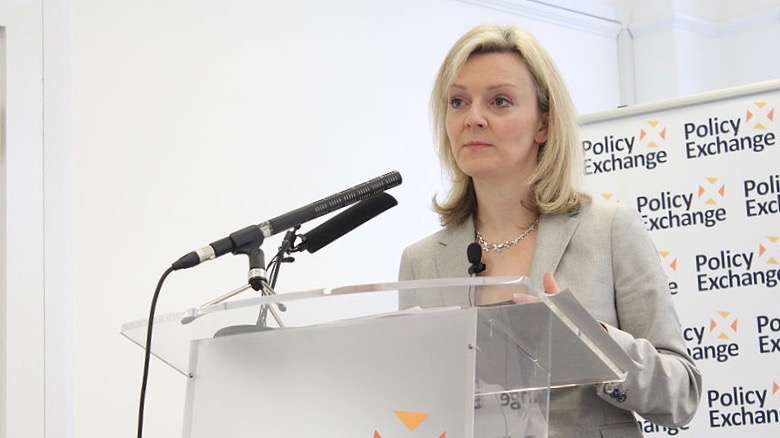At the end of the almost month-long contest for the Conservative Party to choose its new leader and the new prime minister of the United Kingdom, Liz Truss emerged victorious securing 57.4% of the votes polled by her party members. She is set to succeed Boris Johnson – whose own premiership was mired in scandal and economic mismanagement. Johnson has left Britain to Truss in a critical state, mired in the worst cost of living crisis of recent decades, as well as a crisis of legitimacy. Over the past several weeks, Truss campaigned extensively to find some way to distinguish herself both from Johnson and the other Tories in the race.
So, who is Liz Truss?
Throughout her career, Truss has not been one to shy away from her Conservative roots and ideology, and the promises that she made while campaigning reflect that outlook. The central plank of her policy manifesto has been a slashing of taxes across various sectors, in an attempt to deal with the UK’s current financial woes and rising inflation. Her targets so far have included windfall taxes, corporate tax hikes, blocking all new taxes, green energy levies to companies, taxes paid by the self-employed, and inheritance taxes.
She has also suggested that she will roll back the 1.25% hike to the National Insurance that had been introduced last year in an attempt to fund health and social care under then Chancellor Rishi Sunak. Despite this, she has said that public spending will not decrease under her watch, and that more free schools and hospitals will be built during her time as prime minister.
The struggles of the NHS have been in the news a great deal recently, with repeated threats of doctor and nurse walkouts over low pay and poor working conditions, and complaints from patients of months-long wait times to access care. It is unclear how, or if, Truss’ plans would ameliorate this situation at all, especially as she has suggested her openness to diverting billions of pounds from the NHS into social care. Despite this, Truss has simultaneously suggested that the NHS needs a larger budget, but that this must come from “general taxation.” Where this increase in taxation is likely to take place has been unclear.
As energy prices have increased dramatically over the last several months, even Rishi Sunak, her rival for the premiership, felt the need to say that he would do something about energy prices and supply. Truss, in contrast, has opposed a freeze in energy price caps (even if members of her potential cabinet have said they could not rule out the same) and said that she does not support energy rationing. She had also initially said that she does not support direct relief to consumers, before being forced to walk back that particular position. Her proposed solution to the UK’s energy crisis can best be understood by her support for “fracking in areas where people want it to happen,” as well as lukewarm support for nuclear and renewable power.
Increased funding, Truss has also promised, will go to the police, along with an expanded set of powers. She says she will ensure that ‘crime’ decreases by 20%, and called for re-instituting a league-style table to track the effectiveness of various local constabularies against each other. More patrols of the oceans will be launched, border force funding will be increased, and immigrants will be targeted even more ruthlessly; deportations to countries other than Rwanda have been mooted, as well as ways to ensure that immigrants cannot find work in the UK. Overall spending on defense will also be increased.
Internationally, Truss has suggested that she might withdraw the UK from the European Convention on Human Rights (ECHR) so that the government cannot be overruled by it, as happened when a flight deporting refugees to Rwanda was grounded on June 14 after intervention by the European Court of Human Rights. Firmly committed to Brexit, Truss has instead expressed her openness to greater trade with the Commonwealth and a potential free trade agreement with Israel. She has also pledged to tackle Russia and China more comprehensively, and suggested that the UK needs to send more aid and weapons to Ukraine and help rebuild it under a new Marshall plan, but at the same time not “become directly involved in the conflict.”
Domestically, her plans skew close to Tory cultural orthodoxy. She has said she will somehow “stand up for free speech” and at the same time stressed the “need to fight back against the identity politics that has infected [UK] institutions” and the need to reject “woke” civil service culture. She has suggested, as is almost a tradition in Britain, that she will move to exclude trans women from women’s spaces, and attempt to make it harder for those looking to transition.
Truss’ promises however, are full of contradictions and impossibilities, and perhaps it is best not to think of all she has said as a program for the next two years but rather as an election manifesto for the 2024 elections. What does seem clear, however, is that Truss remains committed to the same policies of austerity, privatization, and deregulation for business that has characterized previous Tory governments, and maybe even more so than those who have preceded her. There will be more strike-breaking and sabotage of industrial action under her, and people will continue to be immiserated.





